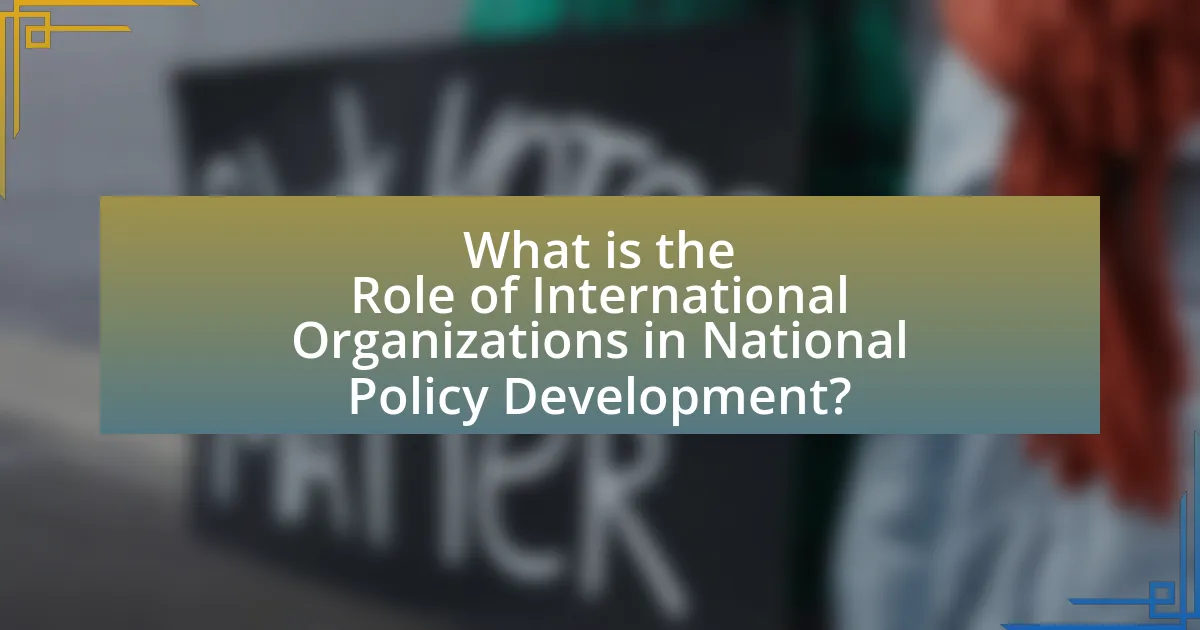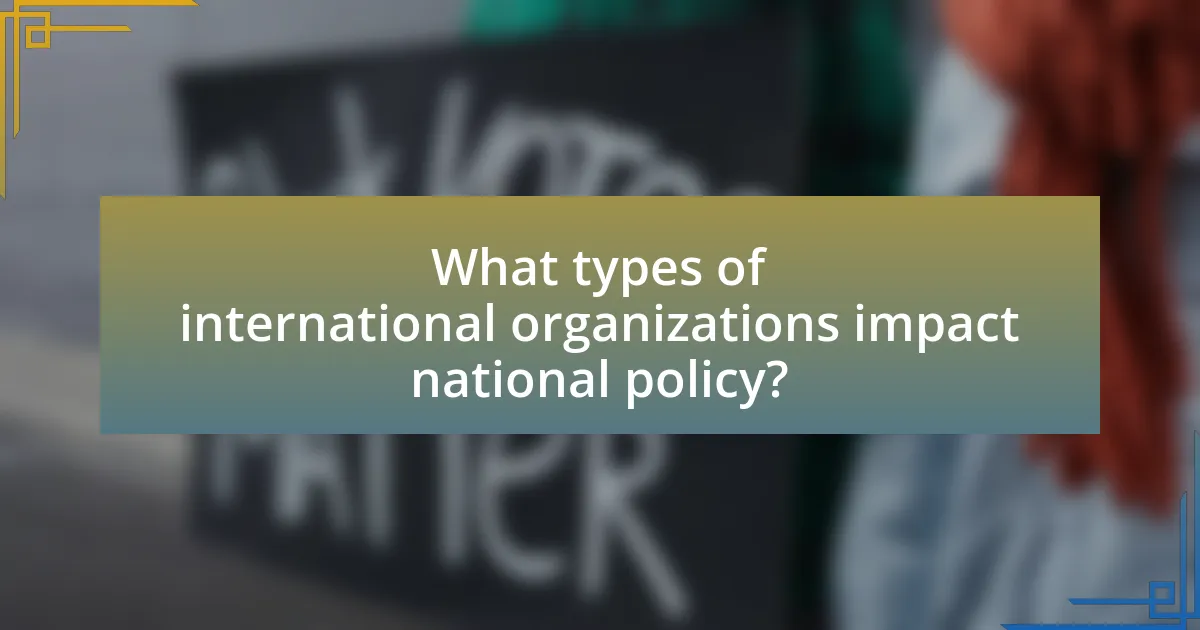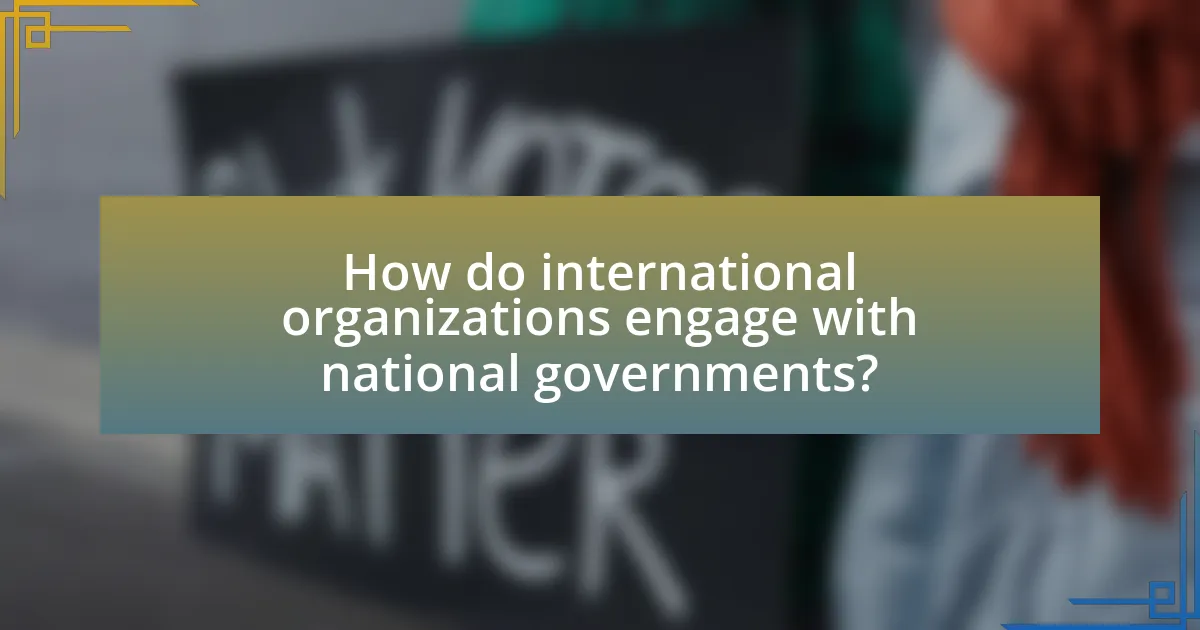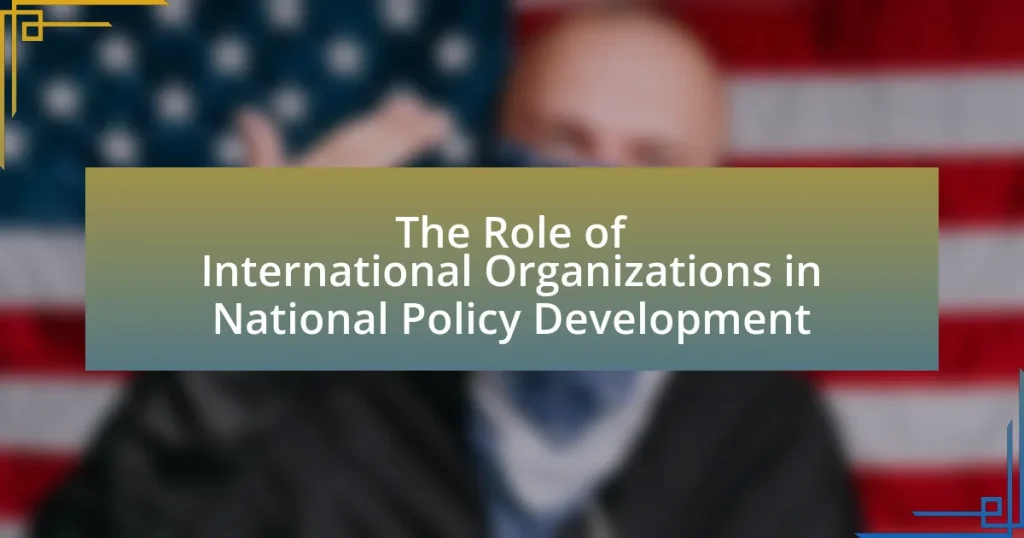International organizations, such as the United Nations and the World Bank, play a vital role in national policy development by providing frameworks, expertise, and resources that guide member states in formulating effective policies. They influence national policies through funding, setting international standards, and facilitating cooperation among countries, which is evident in sectors like health, environment, and trade. The article explores the mechanisms these organizations use to affect policy-making, the impact of international treaties on national legislation, and the benefits countries gain from collaboration. Additionally, it examines the roles of governmental and non-governmental organizations, the challenges faced by international entities, and best practices for national governments in leveraging resources effectively.

What is the Role of International Organizations in National Policy Development?
International organizations play a crucial role in national policy development by providing frameworks, expertise, and resources that guide member states in formulating effective policies. These organizations, such as the United Nations and the World Bank, facilitate collaboration among countries, enabling the sharing of best practices and lessons learned from various contexts. For instance, the World Health Organization offers guidelines that help nations develop health policies based on global health standards and research. Additionally, international organizations often provide funding and technical assistance, which can be pivotal for countries in implementing policies that align with international norms and agreements, such as the Paris Agreement on climate change. This support not only enhances the capacity of national governments but also promotes adherence to international commitments, thereby fostering global cooperation and sustainable development.
How do international organizations influence national policies?
International organizations influence national policies primarily through mechanisms such as providing funding, setting international standards, and facilitating cooperation among countries. For instance, organizations like the World Bank and International Monetary Fund offer financial assistance contingent on the implementation of specific policy reforms, which can lead to significant changes in national governance and economic strategies. Additionally, international treaties and agreements established by organizations, such as the United Nations, create frameworks that countries adopt to align with global norms, thereby shaping domestic legislation. The influence of these organizations is evident in various sectors, including health, environment, and trade, where adherence to international guidelines often drives national policy decisions.
What mechanisms do international organizations use to affect policy-making?
International organizations affect policy-making through mechanisms such as advocacy, technical assistance, and the establishment of norms and standards. Advocacy involves lobbying governments and influencing public opinion to promote specific policies, as seen in the efforts of organizations like Amnesty International to shape human rights legislation. Technical assistance provides expertise and resources to help countries implement policies effectively, exemplified by the World Bank’s support for economic reforms in developing nations. Additionally, the establishment of norms and standards, such as those set by the World Health Organization for public health, guides national policies by creating frameworks that countries are encouraged to adopt. These mechanisms collectively enhance the capacity of international organizations to influence national policy development.
How do international treaties and agreements shape national legislation?
International treaties and agreements significantly influence national legislation by establishing legal obligations that countries must incorporate into their domestic laws. When a nation ratifies a treaty, it commits to aligning its laws with the treaty’s provisions, which often requires legislative changes or the creation of new laws to ensure compliance. For example, the United Nations Convention on the Rights of the Child has prompted numerous countries to amend their laws regarding child protection and welfare to meet international standards. This process demonstrates how international agreements serve as frameworks that guide and shape national policy, ensuring that domestic legislation reflects global norms and commitments.
Why are international organizations important for national policy development?
International organizations are important for national policy development because they provide frameworks for cooperation, facilitate knowledge sharing, and promote best practices among member states. These organizations, such as the United Nations and the World Bank, offer technical assistance and resources that help countries align their policies with international standards and commitments. For instance, the World Health Organization has been instrumental in shaping national health policies through guidelines that address global health challenges, such as pandemics. This collaborative approach not only enhances policy effectiveness but also fosters accountability and transparency in governance.
What benefits do countries gain from collaborating with international organizations?
Countries gain enhanced diplomatic leverage and access to resources by collaborating with international organizations. This collaboration allows nations to address global challenges collectively, such as climate change, health crises, and security threats, which are often beyond the capacity of individual states. For instance, the World Health Organization (WHO) facilitates international cooperation in managing health emergencies, as seen during the COVID-19 pandemic, where countries shared data and resources to combat the virus effectively. Additionally, participation in organizations like the United Nations (UN) provides countries with a platform to influence international norms and policies, thereby enhancing their global standing and fostering economic development through trade agreements and aid programs.
How do international organizations promote best practices in policy development?
International organizations promote best practices in policy development by providing frameworks, guidelines, and technical assistance to member states. These organizations, such as the United Nations and the World Bank, facilitate knowledge sharing through research, capacity building, and the dissemination of successful policy models. For instance, the World Bank’s “Doing Business” report offers comparative data on regulatory practices, helping countries identify effective policies. Additionally, international organizations often host conferences and workshops that bring together policymakers to exchange experiences and strategies, further reinforcing the adoption of best practices.

What types of international organizations impact national policy?
International organizations that impact national policy include intergovernmental organizations (IGOs), non-governmental organizations (NGOs), and multinational corporations (MNCs). IGOs, such as the United Nations and the World Trade Organization, influence national policies through treaties, regulations, and recommendations that member states are encouraged to adopt. NGOs, like Amnesty International and Greenpeace, advocate for specific issues and can shape public opinion and policy through campaigns and lobbying efforts. MNCs, such as Google and ExxonMobil, affect national policy by leveraging economic power and lobbying for favorable regulations. These organizations collectively shape the political landscape and policy decisions within nations.
How do governmental and non-governmental organizations differ in their roles?
Governmental organizations are entities created and operated by a government to implement public policy and provide services, while non-governmental organizations (NGOs) are independent entities that operate without government control, often focusing on social, humanitarian, or environmental issues. Governmental organizations have the authority to create and enforce laws, allocate public funds, and regulate activities within their jurisdiction, as seen in agencies like the Environmental Protection Agency in the United States. In contrast, NGOs rely on donations, grants, and volunteer support to pursue their missions, such as the Red Cross providing disaster relief. This distinction highlights that governmental organizations are primarily accountable to the public and elected officials, whereas NGOs are accountable to their stakeholders and the communities they serve.
What are the key functions of intergovernmental organizations in policy development?
Intergovernmental organizations (IGOs) play crucial roles in policy development by facilitating cooperation among member states, providing expertise, and promoting best practices. They serve as platforms for dialogue, enabling countries to negotiate and align their policies on various issues such as trade, health, and security. For instance, the World Health Organization (WHO) develops health policies and guidelines that member states can adopt, thereby influencing national health strategies. Additionally, IGOs often conduct research and disseminate data, which informs policy decisions; the Organization for Economic Cooperation and Development (OECD) publishes reports that help governments understand economic trends and challenges. These functions underscore the importance of IGOs in shaping effective and coordinated policy responses at national and international levels.
How do non-governmental organizations contribute to national policy agendas?
Non-governmental organizations (NGOs) contribute to national policy agendas by advocating for specific issues, mobilizing public opinion, and providing expertise and research to policymakers. NGOs often engage in lobbying efforts to influence legislation and policy decisions, utilizing their networks to raise awareness and support for their causes. For example, organizations like Amnesty International and Greenpeace have successfully shaped national policies on human rights and environmental protection through campaigns that highlight critical issues and propose actionable solutions. Their ability to gather data, conduct research, and present it to government officials enhances the policymaking process, ensuring that diverse perspectives are considered in national agendas.
What are some examples of international organizations influencing national policy?
International organizations such as the United Nations, World Bank, and International Monetary Fund significantly influence national policy. The United Nations sets global standards and frameworks, such as the Sustainable Development Goals, which countries adopt into their national policies to address issues like poverty and climate change. The World Bank provides financial and technical assistance, shaping economic policies in developing countries through its projects and recommendations. The International Monetary Fund influences fiscal and monetary policies by conditioning financial support on specific economic reforms, as seen in countries like Greece during its financial crisis. These organizations play crucial roles in guiding national policy through their frameworks, funding, and conditional support.
How has the United Nations impacted national policy frameworks?
The United Nations has significantly influenced national policy frameworks by establishing international norms and standards that member states are encouraged to adopt. Through various treaties, resolutions, and programs, the UN promotes human rights, sustainable development, and peacekeeping, which countries often integrate into their domestic policies. For instance, the Sustainable Development Goals (SDGs), adopted in 2015, provide a comprehensive framework that guides nations in formulating policies aimed at eradicating poverty and promoting equality. Additionally, the UN’s role in monitoring compliance and providing technical assistance further reinforces the adoption of these frameworks at the national level.
What role does the World Bank play in shaping economic policies in developing countries?
The World Bank plays a crucial role in shaping economic policies in developing countries by providing financial resources, technical expertise, and policy advice. Through its funding mechanisms, such as loans and grants, the World Bank supports projects that aim to reduce poverty and promote sustainable development. For instance, in 2021, the World Bank committed over $25 billion to projects in low and middle-income countries, focusing on areas like infrastructure, health, and education, which directly influence national economic strategies. Additionally, the World Bank conducts extensive research and analysis, offering data-driven insights that help governments formulate effective policies. This combination of financial support and expert guidance enables developing countries to implement reforms that align with global economic standards and improve their economic resilience.

How do international organizations engage with national governments?
International organizations engage with national governments primarily through collaboration, policy advice, and funding. These organizations, such as the United Nations and the World Bank, often provide technical assistance and expertise to help governments develop and implement policies that align with international standards and best practices. For instance, the World Bank offers financial resources and analytical tools to support national development projects, which can enhance economic growth and reduce poverty. Additionally, international organizations facilitate dialogue between governments and various stakeholders, promoting inclusive policy-making processes. This engagement is crucial for addressing global challenges, such as climate change and public health, where coordinated efforts are necessary for effective solutions.
What strategies do international organizations use to collaborate with national governments?
International organizations collaborate with national governments through strategies such as capacity building, policy dialogue, and financial assistance. Capacity building involves providing training and resources to enhance the skills and capabilities of government officials, enabling them to implement effective policies. For example, the United Nations Development Programme (UNDP) offers technical assistance to improve governance and public administration in various countries.
Policy dialogue facilitates discussions between international organizations and national governments to align priorities and share best practices. The World Bank, for instance, engages in regular consultations with government officials to ensure that development projects meet national needs.
Financial assistance is another critical strategy, where international organizations provide funding for specific projects or programs that support national development goals. The International Monetary Fund (IMF) offers loans to countries facing economic challenges, contingent upon the implementation of agreed-upon policy reforms. These strategies collectively enhance collaboration and support national governments in achieving their policy objectives.
How do capacity-building initiatives enhance national policy development?
Capacity-building initiatives enhance national policy development by equipping government institutions and stakeholders with the necessary skills, knowledge, and resources to formulate and implement effective policies. These initiatives often involve training programs, workshops, and technical assistance that improve the capabilities of policymakers and civil servants. For instance, the United Nations Development Programme (UNDP) has implemented capacity-building projects that have led to improved governance and policy frameworks in various countries, demonstrating a direct correlation between enhanced skills and more effective policy outcomes.
What role does advocacy play in the relationship between international organizations and national governments?
Advocacy serves as a crucial mechanism that facilitates dialogue and collaboration between international organizations and national governments. Through advocacy, international organizations promote specific policies, norms, and practices that align with global standards, thereby influencing national policy development. For instance, the World Health Organization advocates for public health initiatives that national governments may adopt to improve health outcomes, demonstrating how advocacy can lead to the implementation of effective health policies. This relationship is further evidenced by the fact that many countries align their national legislation with international treaties and agreements, such as the Paris Agreement on climate change, which was shaped by advocacy efforts from various international entities.
How do international organizations address challenges in national policy development?
International organizations address challenges in national policy development by providing technical assistance, facilitating knowledge sharing, and promoting best practices among member states. For instance, the World Bank offers financial resources and expertise to help countries design effective policies, while the United Nations provides a platform for dialogue and collaboration on global issues. These organizations often conduct research and publish reports that highlight successful policy frameworks, enabling countries to learn from each other’s experiences. Additionally, international organizations may set standards and guidelines that influence national policies, such as the World Health Organization’s recommendations on public health. This multifaceted approach helps nations navigate complex policy challenges and implement effective solutions.
What are the common obstacles faced by international organizations in influencing national policies?
International organizations commonly face obstacles such as sovereignty concerns, political resistance, and resource limitations when attempting to influence national policies. Sovereignty concerns arise as nations prioritize their autonomy and may reject external influence, viewing it as an infringement on their rights. Political resistance often manifests through domestic political agendas that conflict with the goals of international organizations, leading to a lack of cooperation. Additionally, resource limitations, including financial constraints and insufficient personnel, hinder the capacity of international organizations to effectively engage with national governments and implement policy changes. These factors collectively impede the ability of international organizations to shape national policy effectively.
How do international organizations adapt to different political contexts in various countries?
International organizations adapt to different political contexts in various countries by employing tailored strategies that consider local governance structures, cultural norms, and political dynamics. For instance, organizations like the United Nations and World Bank assess the political landscape through stakeholder consultations and political risk analyses, allowing them to align their initiatives with national priorities and engage effectively with local authorities. This adaptability is evidenced by the World Bank’s use of country-specific diagnostic tools, which help identify unique challenges and opportunities in each nation, ensuring that their development programs are relevant and effective.
What best practices can national governments adopt when working with international organizations?
National governments can adopt several best practices when working with international organizations, including establishing clear communication channels, aligning national policies with international standards, and fostering collaborative partnerships. Clear communication ensures that both parties understand objectives and expectations, which enhances cooperation. Aligning national policies with international standards, such as those set by the World Health Organization or the United Nations, can improve compliance and effectiveness in addressing global challenges. Collaborative partnerships, exemplified by joint initiatives and shared resources, can lead to more impactful outcomes, as seen in successful programs like the Global Fund to Fight AIDS, Tuberculosis, and Malaria, which combines efforts from multiple countries and organizations to tackle health crises effectively.
How can national governments effectively leverage resources from international organizations?
National governments can effectively leverage resources from international organizations by establishing strategic partnerships and aligning their national priorities with the goals of these organizations. For instance, countries can access financial aid, technical assistance, and capacity-building programs offered by entities such as the World Bank or the United Nations. Evidence of this can be seen in the case of Rwanda, which successfully utilized World Bank funding to enhance its education sector, resulting in a significant increase in primary school enrollment rates from 70% in 2000 to over 97% in 2018. By actively engaging in dialogue, participating in international forums, and tailoring their requests to match the objectives of these organizations, national governments can maximize the benefits derived from international resources.
What strategies can enhance the effectiveness of partnerships with international organizations?
To enhance the effectiveness of partnerships with international organizations, establishing clear communication channels is essential. Effective communication fosters transparency and ensures that all stakeholders are aligned on goals and expectations. Research indicates that organizations with structured communication frameworks report a 25% increase in project success rates, as seen in the collaboration between the United Nations and various NGOs. Additionally, leveraging shared resources and expertise can significantly improve outcomes; for instance, joint initiatives often lead to innovative solutions that address complex global challenges. Furthermore, setting measurable objectives and regularly evaluating progress can help maintain focus and accountability, which is crucial for sustaining long-term partnerships.















